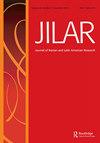Literatura y exilio: desarraigo, refugiados y la ambigüedad de la memoria en el sur de Europa
IF 0.3
0 HUMANITIES, MULTIDISCIPLINARY
Journal of Iberian and Latin American Research
Pub Date : 2021-05-04
DOI:10.1080/13260219.2021.1994734
引用次数: 0
Abstract
ABSTRACT In February 2017, the most massive demonstration in favor of refugees took place in Barcelona with the motto Refugees welcome! Yet, since then migration policies have become more restrictive under the influence of neofascist movements. How are we to cope with this social polarization? How are we to overcome the moral paralysis of Southern Europe regarding refugee policies? Since language creates reality, this article will examine the vagueness of words used to describe the different fluxes of forced mobility. Etymological analysis reveals how the use of terminology has been politicized up to the point of inhibiting any possible collective reaction. Following these considerations, the phenomenology of exile developed by philosophers and writers such as Josep Solanes and María Zambrano is recovered. The article proposes the articulation of a memory of exile as an ethical imperative for Europe, a continent of former settlers, outcasts, exiled and refugees.文学与流亡:南欧的背井离乡、难民与记忆的模糊性
摘要2017年2月,巴塞罗那发生了最大规模的支持难民的示威游行,口号是“欢迎难民!”!然而,从那时起,在新法西斯运动的影响下,移民政策变得更加严格。我们如何应对这种社会两极分化?我们如何克服南欧在难民政策方面的道德瘫痪?由于语言创造了现实,本文将研究用于描述强迫流动的不同流动的词语的模糊性。词源分析揭示了术语的使用是如何被政治化的,以至于抑制了任何可能的集体反应。基于这些考虑,约瑟普·索拉内斯和玛丽亚·赞布拉诺等哲学家和作家发展起来的流亡现象学得以恢复。这篇文章提出,对欧洲这个由前定居者、被驱逐者、流亡者和难民组成的大陆来说,表达流亡记忆是一项道德义务。
本文章由计算机程序翻译,如有差异,请以英文原文为准。
求助全文
约1分钟内获得全文
求助全文
来源期刊

Journal of Iberian and Latin American Research
HUMANITIES, MULTIDISCIPLINARY-
CiteScore
0.60
自引率
0.00%
发文量
22
 求助内容:
求助内容: 应助结果提醒方式:
应助结果提醒方式:


